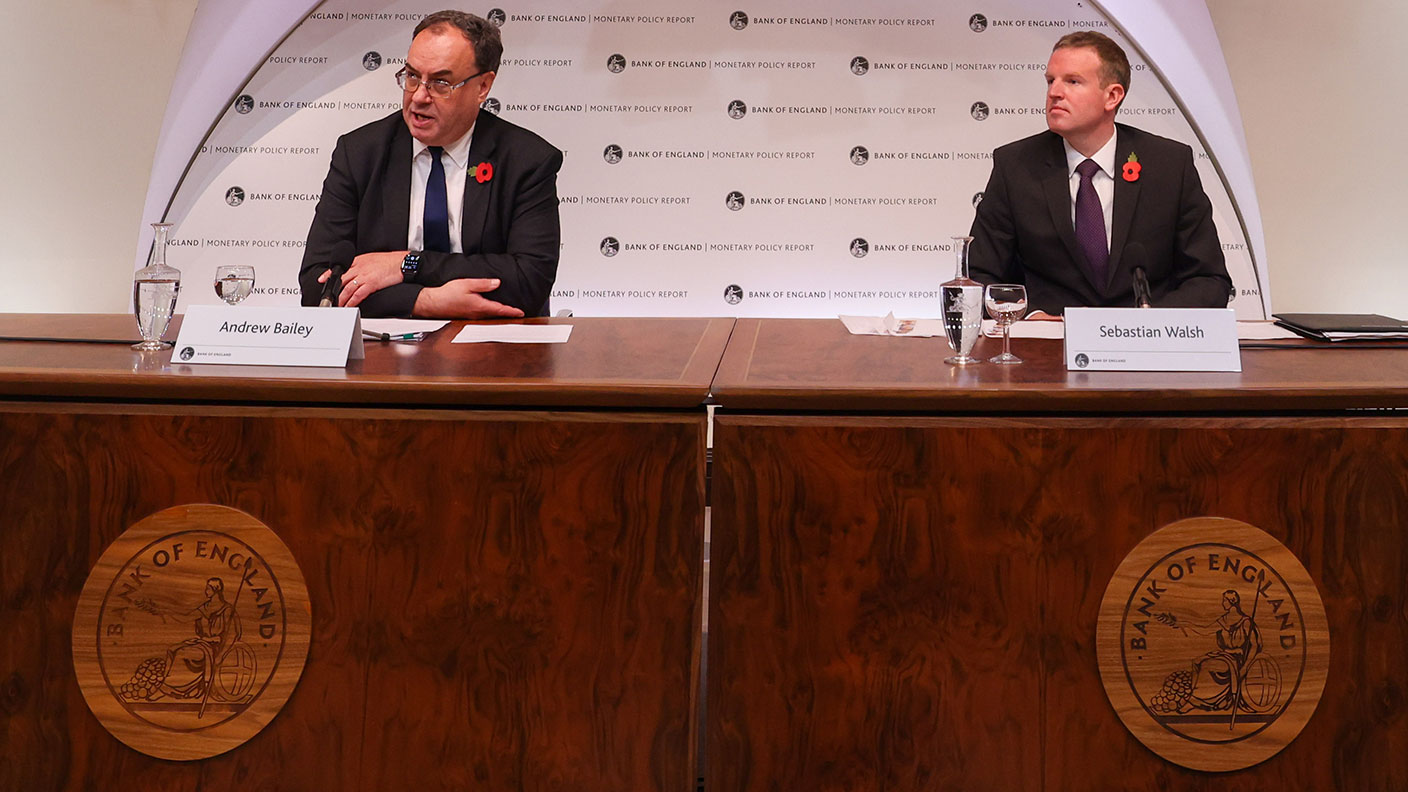Inflation forecasts mean interest rates should be on the rise – so why aren’t they?
With inflation forecast to hit 5% next year, we might expect interest rates to be rising, says Merryn Somerset Webb. But central banks are holding off. Why?


Get the latest financial news, insights and expert analysis from our award-winning MoneyWeek team, to help you understand what really matters when it comes to your finances.
You are now subscribed
Your newsletter sign-up was successful
Want to add more newsletters?

Twice daily
MoneyWeek
Get the latest financial news, insights and expert analysis from our award-winning MoneyWeek team, to help you understand what really matters when it comes to your finances.

Four times a week
Look After My Bills
Sign up to our free money-saving newsletter, filled with the latest news and expert advice to help you find the best tips and deals for managing your bills. Start saving today!
In January 1965, Graeme Dorrance, chief of the Financial Studies Division at the International Monetary Fund (IMF), wrote an article called Inflation and Growth: The Statistical Evidence for an issue of IMF Staff Papers.
It might not sound particularly exciting (it is not an easy read). But it was, as the IMF proudly pointed out when he offered up his next paper, “widely reprinted” at the time – something I suspect you didn’t get much with IMF papers in the 1960s.
It was so popular because it made something almost ridiculously complicated suddenly look very simple: Dorrance introduced the idea of a magic number for economic management – 2%. This, he said, in relatively advanced economies at least, looked to be the optimum inflation level, for “encouraging growth in output”.
MoneyWeek
Subscribe to MoneyWeek today and get your first six magazine issues absolutely FREE

Sign up to Money Morning
Don't miss the latest investment and personal finances news, market analysis, plus money-saving tips with our free twice-daily newsletter
Don't miss the latest investment and personal finances news, market analysis, plus money-saving tips with our free twice-daily newsletter
He figured that deflation was impossible given that developed economies were jammed by trade unions and monopolistic price-setting companies. Totally stable prices were possible (zero inflation) but not particularly desirable – if prices can’t fall, you need a little inflation to allow relative prices to adjust. Two percent seemed to work for that – and seemed to be working for Italy, Denmark, Japan and Nicaragua at the time.
The magic number isn’t quite so magic after all
So there you have it. Fiddle with interest rates until you get your magic number and the rest would take care of itself. Hello, long-term economic growth.
Or not. Not everyone was impressed by the argument at the time – an article in the now defunct Statist magazine a year later dismissed the whole thing as a confusion between correlation and causation combined with the careless use of averages.
The author, who doubted “there is a link at all” between inflation and growth, said you can’t take all the complications of an economy and boil it down to 2%.
Fifty-five years on, most major central banks claim an inflation target of 2% – everyone likes magic numbers. But it is beginning to look like they might be coming around to the Statist view too.
Look to the UK: here CPI inflation is running at 3.1% and the Bank of England expects it to peak at 5% near year. That’s more than double our magic number – so you’d think that rates would be on the up at some speed.
Yet despite heavy hints from various policymakers that we would on Thursday see a rise from the lowest-ever base rate of 0.1% to 0.25% we saw no change.
“Supply problems” only explain so much
There is some sense in this. The inflation we see at the moment is based on supply problems, rising energy prices and increased labour costs. A 0.15 percentage point rise in interest rates can’t do much to help with these things. And if they are related in the main to pandemic policies and are therefore temporary anyway, why not just ignore them – and let inflation naturally fall back to earth next year as shortage turns to surplus?
The first problem with this argument is that it only partially holds good. You can’t have supply constraints without demand for the goods in the first place – so to the extent that a rate rise would curtail demand it would at least slightly damp inflation.
The second issue is that almost as soon as the “it’s just a supply” block argument was made, the Bank of England effectively dismissed it. Rate rises might not be necessary now it said but “providing incoming data is consistent with forecast” they may be “necessary over the coming months”.
There is no suggestion that the BoE expects the drivers of inflation to change, so why not act now?
The third problem is about reputation and expectation. The Bank has told us for ages that the inflation we feel all around us is transitory. But it is also now telling us that it is “materially higher” than expected.
If officials believe in their magic number – and want us to feel certain in their confidence in it – they should surely confirm that to us with at least a small rise in rates now.
That’s particularly the case given that with most mortgages fixed and household finances reasonably healthy, the negative impact of a tiny rise would be fairly limited. Pantheon Macroeconomics points out that bank debt as a percentage of household annual disposable income is slightly lower than in 2017 and much lower than in 2008.
So how can you get an income from your investments?
On the plus side, there is useful information in all this for investors. The key takeaway should be that while rates will rise from here (fix your mortgage fast if you are one of the few who has not) there is going to be some epic foot dragging along the way – and you are very unlikely to see them near or above inflation for the foreseeable future.
Anyone expecting to make a real return on cash on deposit any time soon will be sorely disappointed. This brings us to the dilemma of how those looking to get an income from savings or investments can actually get one.
The answer here might be to think about why so many equities are so low-yielding in the first place. Low interest rates make dividends more valuable and so force up share prices – effectively turning what was yield into capital gains.
If you can get your head around this, the next step is to think that it makes perfectly good sense to treat some of those gains as though they are income. Hold that thought and have a look at Alliance Trust (LSE: ATST). The trust (big, global, diversified) has just announced that it is to reset its quarterly dividend at a materially higher level – up about 30% to 2.3% – with the intention of continuing to increase it every year as well.
That dividend will not be covered by the income the trust receives from its investments every year – so its introduction effectively represents the conversion of some capital into income. Back in the days when savings accounts paid interest at higher than the rate of inflation and stock market valuations looked vaguely reasonable, that might have looked like a bad thing. Today it seems perfectly reasonable.
• This article was first published in the Financial Times
Get the latest financial news, insights and expert analysis from our award-winning MoneyWeek team, to help you understand what really matters when it comes to your finances.

-
 Japanese stocks rise on Takaichi’s snap election landslide
Japanese stocks rise on Takaichi’s snap election landslideJapan’s new prime minister Sanae Takaichi has won a landslide victory in a snap election, prompting optimism that her pro-growth agenda will benefit Japanese stocks
-
 Alphabet 'is planning a 100-year bond': would you back Google for 100 years?
Alphabet 'is planning a 100-year bond': would you back Google for 100 years?Google owner Alphabet is reported to be joining the rare century bond club
-
 The outlook for stocks is improving
The outlook for stocks is improvingThis is the best of times for investors, says Max King. Global risks are receding, but few have noticed.
-
 The building blocks for an income strategy: resilience, growth and diversification
The building blocks for an income strategy: resilience, growth and diversificationAdvertisement Feature Iain Pyle, Investment Manager, Shires Income plc
-
 Investment platforms: how to avoid sub 2% interest rates on cash holdings and secure a better deal
Investment platforms: how to avoid sub 2% interest rates on cash holdings and secure a better dealDo you know how much interest the cash balance in your investment portfolio, ISA or Sipp earns? We lift the lid on the best and worst interest-payers – and explain what you can do about it
-
 Rethinking ESG investing
Rethinking ESG investingAnalysis Sustainable ESG funds are coming under attack for a lack of focus. Investors need to be selective
-
 Can a woman deliver you better returns?
Can a woman deliver you better returns?Tips Women often make better stock pickers than men, delivering stronger returns for investors - but with fewer females managing funds, how can you make sure you take advantage of the feminist touch when picking funds? Kalpana Fitzpatrick on how to filter funds run by women and why it matters.
-
 Flat fees vs percentage fees - are you paying too much for your investments?
Flat fees vs percentage fees - are you paying too much for your investments?We investigate whether it’s better to choose an investment platform with flat fees, or whether percentage charges could work out cheaper.
-
 What is a dividend yield?
What is a dividend yield?Videos Learn what a dividend yield is and what it can tell investors about a company's plans to return profits to its investors.
-
 Fund platform launches low cost £4.99 a month service for small investors - we see how it compares
Fund platform launches low cost £4.99 a month service for small investors - we see how it comparesAdvice Aimed at investors with small investment pots of £30k or less, fund platform interactive investors has launched a low costs service - but is it any good and how does it compare to rivals?